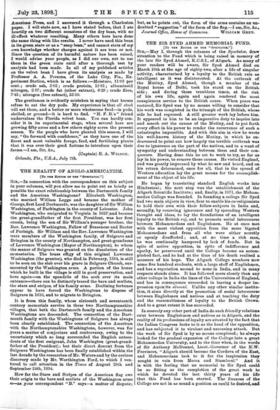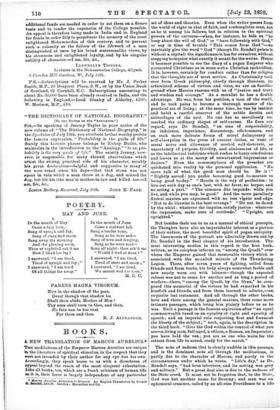THE SIR SYED ARMED MEMORIAL FUND.
[To THE EDITOR OF THE " SPECTATOR."]
Si,—May I, through the columns of the Spectator, draw attention to the Fund which is being raised in memory of the late Sir Syed Ahmed, K.C.S.I., of Aligarh. As many of your readers will be aware, Sir Syed Ahmed died on March 10th at the age of eighty-two, after a life of singular activity, characterised by a loyalty to the British rule as intelligent as it was disinterested. At the outbreak of the Mutiny, Syed Ahmed, though a member of the Royal house of Delhi, took his stand on the British side ; and during those troublous times, at the risk of his own life, again and again rendered the most conspicuous service to the British cause. When peace was restored, Sir Sped was by no means willing to consider that his work was completed in the triumph of the British, whose side he had espoused. A still greater work lay before him. It appeared to him to be an imperative duty to inquire into and search out the causes of the Mutiny, and to put forth every effort in his power to render the recurrence of such a, catastrophe impossible. And with this aim in view he wrote his well-known history of the Mutiny, in which he en- deavoured to point out how largely the terrible outbreak was due to ignorance on the part of the natives, and to a want of sympathy and understanding between them and their con- querors. Having done this he set to work to try, as far as lay in his power, to remove these causes. He visited England, and was greatly impressed by what he saw and heard, and on his return determined, once for all, that in the spread of Western education lay the great means for the accomplish- ment of the object of his life.
He began by translating standard English works into Hindustani ; the next step was the establishment of the Aligarh Scientific Institute ; and, finally, in 1871, the Moham- medan College was founded. In founding a college Sir Syed had two main objects in view, first to enable his co-religionists to hold their own with their fellow-subjects in India and, secondly, by removing ignorance and by spreading Western thought and ideas, to lay the foundations of an intelligent loyalty to the British raj, and to promote social intercourse between Mohammedans and Englishmen. He at once met with the most violent opposition from the more bigoted Mohammedans and from all who were either secretly or openly disaffected ; and, at no time a rich man, he was continually hampered by lack of funds. But in spite of active opposition, in spite of indifference and apathy, he persevered until the College became an accom- plished fact, and he had at the time of his death realised a measure of his hope. The Aligarh College numbers now some five hundred students, with a large staff of Englishmen, and has a reputation second to none in India, and in many respects stands alone. It has followed more closely than any other college in India the lines of the Universities of England, and has in consequence succeeded in leaving a deeper im- pression upon its alumni. Unlike any other similar institu- tion, it aims directly at the promotion of social intercourse between Englishmen and natives and at teaching the duty and the reasoaableness of loyalty to the British Crown. And to a great extent it has succeeded.
In scarcely any other part of India do such friendly relations exist between Englishmen and natives as in Aligarh, and the reality of its professions of loyalty are attested by the fact that the Indian Congress looks to it as the head of the opposition, and has subjected it to virulent and unceasing attack. But the work of Sir Syed is by no means completed ; he always looked for the gradual expansion of the College into a great Mohammedan University, and to the time when, in the words of Sir Anthony McDonnel, Lieut.-Governor of the N.W. Provinces, "Aligarh should become the Cordova of the East, and Mohammedans look to it for the inspiration they sought in vain from Mecca and Stamboul." And it is with the feeling that no memorial to Sir Syed could be so fitting as the completion of the great work to which he devoted the last thirty years of his life that this Fund has been started. The finances of the College are not in as sound a position as could be desired, and
additional funds are needed in order to set them on a firmer basis and to render the expansion of the College possible. An appeal is therefore being made in India and in England for funds in order fitly to perpetuate the memory of the most enlightened Mohammedan of this century, and to prevent such a calamity as the failure of the lifework of a man distinguished at once by his broad statesmanlike views, by his strenuous and enlightened loyalty, and by his singular nobility of character.—I am, Sir, &c.,
LLEWELLYN TIPPING.
P.S.—Subscriptions will be received by Mr. J. Parker Smith, M.P., 20 Draycott Place, S.W., or by the Union Bank of Scotland, 62 Cornhill, E.C. Subscriptions amounting to about Rs. 30,000 have been already received in India, and the following in England,—Lord Stanley of Alderley, E200; W. Morison, M.P., E10.



































 Previous page
Previous page